 Many readers may have been aware of the thousands of free e-books available on Project Gutenberg, but did you know they also have music? The Gutenberg Sheet Music Project, thanks to the work of many volunteer hours, has digitized public domain sheet music, using a variety of techniques (MIDI, PDF, MOBI, plain text, etc.), to enable study and performance. For the most part, the musical pieces created have been chamber music, with composers such as Brahms and Beethoven. A great incentive to getting together your own community music group!
Many readers may have been aware of the thousands of free e-books available on Project Gutenberg, but did you know they also have music? The Gutenberg Sheet Music Project, thanks to the work of many volunteer hours, has digitized public domain sheet music, using a variety of techniques (MIDI, PDF, MOBI, plain text, etc.), to enable study and performance. For the most part, the musical pieces created have been chamber music, with composers such as Brahms and Beethoven. A great incentive to getting together your own community music group!
Classic Comics
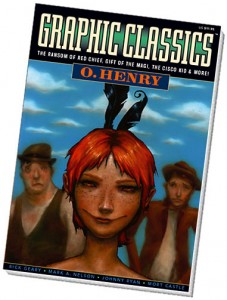 “Graphic Classics is a series of books presenting great fiction in comics and illustration for contemporary readers ages 12 to adult. Each volume features the works of the world’s greatest authors, illustrated by some of the best artists working today in the fields of comics, illustration and fine arts.”
“Graphic Classics is a series of books presenting great fiction in comics and illustration for contemporary readers ages 12 to adult. Each volume features the works of the world’s greatest authors, illustrated by some of the best artists working today in the fields of comics, illustration and fine arts.”
Happy Mother’s Day
Top ten Worst Mothers in Literature. I’ll be looking forward to worst fathers…
What I’m Reading and So What
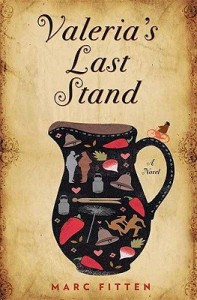 Here’s the problem when you have a friend who writes a book and gives you a copy, then wants to know what you think about it. What if you think it’s absolute crap? Well, long-time friend of NewPages, Marc Fitten, would know that if I thought it was crap, I would tell him so, with lots of facial gestures and dramatic delivery of, “Oh my god, this is the worst thing I’ve ever read.” And that would only be the beginning.
Here’s the problem when you have a friend who writes a book and gives you a copy, then wants to know what you think about it. What if you think it’s absolute crap? Well, long-time friend of NewPages, Marc Fitten, would know that if I thought it was crap, I would tell him so, with lots of facial gestures and dramatic delivery of, “Oh my god, this is the worst thing I’ve ever read.” And that would only be the beginning.
As it turns out, Marc’s first novel, Valeria’s Last Stand, out now from Bloomsbury, is not crap (how’s that for a book cover blurb?).
However, fearing it would be, I did put off reading it for a while, which is not what I would recommend to anyone else. In fact, once I started reading it, fearful with every turn of the page that it would disappoint in some way, I have to admit, I became completely absorbed in the story. I found the characters entering my daily thoughts and I was eager to get back to reading, to find out what was going to happen next.
Likened to a fable or fairy tale, I would take this novel and its characters to another level. This is mythology and archetypes vividly developed with contemporary twists. The main character, Valeria, is the town matriarch/baba yaga. She is a 68-year-old spinster living in a fictional, off-the-map small town (Zivatar) in post-Communist Hungary. Though ostracized in some ways of the baba-yaga, at the same time, she yields great power over the community, keeping the daily market standards high under her scornful eye, as in this exchange:
Valeria then sniffed the vegetable in question and shook her head.
“How old is this?”
The vendor was speechless.
“Why does it smell like urine?”
The vendor shrugged.
“Are you letting your cat pee on these? You should be imprisoned,” Valeria said, and tugged at her keys.
Her ever present maternal keys, the symbols of her meager power and control over every cupboard in her home, soon fall to the wayside along with her self-control, as she finds herself attracted to the equally aged town potter. Not to give away too much, Valeria and the potter have a lovely tryst, which is problematic for 58-year-old Ibolya, the Aphrodite bar owner who has her own flocculating relationship with the potter. Add to the mix a Loki chimney sweep whose entrance into the village creates greater havoc than luck, and a Zeus of a mayor who sees the town and the people as his playthings while (of course) screwing around on his trophy wife. It’s delicious. All absolutely delicious. And that’s just a loosely related character map. There’s so much more.
Most stunning to me in the book is the third person omniscient narration that fairly reveals the complexity of thought of each character, not necessarily in segments, but interwoven throughout the story. As carefully as we read and watch the potter build prototype after prototype of his creations for Valeria (first an ewer, then a pair of vases), so too does the story blend and mix the clay of the characters through each new development of their stories.
And, no, the potter has no name, nor does his male apprentice, nor the male chimney sweep, nor the male mayor character (well, other than Mayor, at times). Which is not to say this isn’t a man’s story just as much as it is a woman’s story. In that, Fitten has created a wonderful blend, and played both genders seamlessly. It reminds me of the line from the movie As Good As It Gets, when the woman asks Jack Nickolson’s character, “How do you write women so well?” Only, instead of his smarmy response, I can say that Fitten writes both men and women well, tapping into that which makes them tender as well as tough, each with their strength of independence, and each with their need for one another, right down to the most resistant of them.
Shifts and changes in relationships and aging are all a part of this narrative. Considered the first in a trilogy of books focused on strong female characters, our protagonist in this story is 68, but no where near retirement from that which brings her pleasure in life. In fact, Valeria is just beginning a very new kind of awakening for herself. At 58, Ibolya sees her days of sexual power coming to an end: “no matter how short her skirt was or how far over she leaned, the men she enticed were now all older than she was. Their handsome grandsons smiled and flirted, but she could see in their eyes that there was no real interest in there.” To solve her dilemma, and keep the men drinking and spending money, she hires young Zsofi, who is in love with the potter’s somewhat clueless and somewhat resistant apprentice. Theirs is the youngest relationship in the book, and equally as intertwined with the others.
In addition to creating the story of the daily lives of these characters as they move forward, Fitten has also done well to include numerous backstories in the narrative. That of Valeria’s having to grow up quickly and take care of herself, of the potter’s care for his dying wife, of Ilboyla’s being left alone to fend for herself and using her sexual power to do so, of the mayor’s long list of failed attempts to bring capitalism to the town that time forgot, and of the chimney sweep’s disgust for his own profession, as well as, of all things, an intriguing backstory of the bicycle he uses as his transportation. These backstories do not disrupt nor drag on the flow of the story as they are carefully crafted into the narrative and so concisely and specifically developed in the intricacy of their detail as to feel necessary and integral.
Thematically this is an ambitious novel: place, change, progress, power, love, lust, ambition, aging, relationships, and how much more? Yet, I never felt in reading it that there was any lack of control or chaos among these. Each seems to come forth through the myriad characters and storylines that create the narrative in whole. It was only in finishing the book did I feel a sudden, overwhelming swirl of all it had contained. Not a negative outcome for me as a reader, and actually, one which I prefer, since it keeps me thinking about the book long after I have finished reading it. As well as recommending it to others. Highly. And anxiously awaiting the next in the trilogy.
New Lit on the Block :: Poesy Planet
Producer Paul A. Toth, editor of Hit and Run Magazine and Sitting Pretty Magazine, is just getting started with Poesy Planet, a weekly mini-podcast that will feature one poet reading up to five poems, 15 minutes max. Currently featuring Gabriel Orgrease and Emilia A. Phillips, Poesy Planet is accepting submissions. See website for information on creating your own mp3. Poesy Planet can be found listed on NewPages Guide to Multimedia: Podcasts, Video, and Audio.
Awards :: Malahat Review
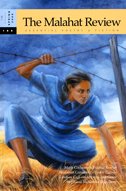 The Malahat Review has announced that this year’s recipient of the Jack Hodgins Founders’ Award for Fiction is Sarah L. Taggart of Vancouver, for her short story “Deaf,” which appeared in the Summer 2008 issue. Taggart’s award-winning story was chosen by Steven Heighton.
The Malahat Review has announced that this year’s recipient of the Jack Hodgins Founders’ Award for Fiction is Sarah L. Taggart of Vancouver, for her short story “Deaf,” which appeared in the Summer 2008 issue. Taggart’s award-winning story was chosen by Steven Heighton.
The Malahat Review also announced the winner of this year’s P. K. Page Founders’ Award for Poetry is Shane Rhodes of Ottawa for his poem, “For Donnie Peters (1964-1999),” which appeared in the Summer 2008 issue. Shane Rhodes’ award-winning poem was chosen by Harold Rhenisch.
Poetry and Healing
A Symposium on the Poetics of Healing
San Francisco State University
Saturday May 9, 2009
Supported by a two-year project grant from the Creative Work Fund, the Poetry Center will be hosting throughout 2009 a series of programs under the title The Poetics of Healing: creative investigations in art, medicine, and somatic practice. Curated by San Francisco poet and scholar Eleni Stecopoulos, the project will bring together innovative writers, artists, and medical practitioners doing parallel work within altogether different traditions and practices.
Guest participants will read, perform, and discuss their own work, talk with each other, and engage with audiences. Throughout the project, Eleni Stecopoulos will be writing an original book on the subject (incorporating material by other participants and as arising out of the public forum) to be published late 2010 by Factory School.
Farewell to The Puritan
The Puritan Editors Spencer Gordon and Tyler Willis have sent notice that as of May 1, 2009, “The Puritan is officially out of commission.” Citing “including insurmountable financial debt, a dramatic change in location, and the current abysmal economy,” the magazine will be on “permanent hiatus.” As with so many mags, that pretty much means done unless a lot of money were to fall into their laps. Our thanks to The Puritan for their work in bringing new voices onto the lit scene for so many years.
Antioch and Cowboy Education
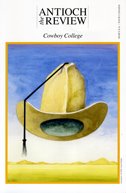 Intrigued as I am by magazine covers, the “Cowboy College” line on the cover of Antioch Review (Spring 2009) drew me in. Editor Robert Fogerty takes a moment to introduce Bruce Fleming’s lead essay on his ‘student-centered-learning’ experience at Deep Springs, “a unique educational endeavor located in the wilderness in California.” Fogerty writes, “There is more here than a look at a quirky college; it is, rather, an examination of educational vlaues and vexing questions about authority and a look at a slice of contemporary youth culture. And most important it is an essay that looks at a much more fundamental issue: what is the purpose of an education?” Explored, though I don’t dare say answered in Flemings essay, this is just the start of a very diverse, conversation-starter issue of Antioch.
Intrigued as I am by magazine covers, the “Cowboy College” line on the cover of Antioch Review (Spring 2009) drew me in. Editor Robert Fogerty takes a moment to introduce Bruce Fleming’s lead essay on his ‘student-centered-learning’ experience at Deep Springs, “a unique educational endeavor located in the wilderness in California.” Fogerty writes, “There is more here than a look at a quirky college; it is, rather, an examination of educational vlaues and vexing questions about authority and a look at a slice of contemporary youth culture. And most important it is an essay that looks at a much more fundamental issue: what is the purpose of an education?” Explored, though I don’t dare say answered in Flemings essay, this is just the start of a very diverse, conversation-starter issue of Antioch.
The New Bomb
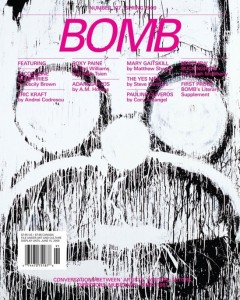 Started in 1981 in downtown New York, BOMB has continued through the years to provide a forum for conversations between artists, writers, directors, actors, and musicians. This spring, BOMB gets a bit of a makeover with new layouts, a new logo, and a new, even larger trim size. Still the same is the great content BOMB has long established, including its literary supplement insert, including works by Ana Menedez, Rusty Morrison, Sally Anne Clegg, J.R. Thelin, Charles Mary Kubricht, Ben Ehrenreich, Laura Mullen, and Michael Martone. And this is just the insert, so you can imagine what the rest of the magazine has to offer! Or, better yet, visith BOMB and find out for sure.
Started in 1981 in downtown New York, BOMB has continued through the years to provide a forum for conversations between artists, writers, directors, actors, and musicians. This spring, BOMB gets a bit of a makeover with new layouts, a new logo, and a new, even larger trim size. Still the same is the great content BOMB has long established, including its literary supplement insert, including works by Ana Menedez, Rusty Morrison, Sally Anne Clegg, J.R. Thelin, Charles Mary Kubricht, Ben Ehrenreich, Laura Mullen, and Michael Martone. And this is just the insert, so you can imagine what the rest of the magazine has to offer! Or, better yet, visith BOMB and find out for sure.
Altered Books
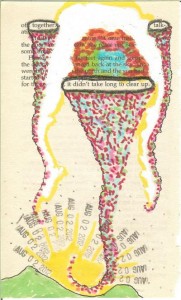 “The Idea: Cut the bindings off of books found at a used book store. Find poems in the pages by the process of obliteration. Put pages in the mail and send them all around the world. Lather, rinse, repeat.”
“The Idea: Cut the bindings off of books found at a used book store. Find poems in the pages by the process of obliteration. Put pages in the mail and send them all around the world. Lather, rinse, repeat.”
The Altered Books site is a chronicle of a very specific set of collaborations between the artists and titles. Participants include: John M. Bennett, David-Baptiste Chirot, Holly Crawford, Fran Hill, Jennifer Hill-Kaucher, Geof Huth, Adeena Karasick, Helen Kaucher, Donna Kuhn, Jim Leftwich, Mike Magazinnik, Tim Martin, Kristen McQuillin, Sheila E. Murphy, Ross Priddle, Meghan Scott, Michelle Taransky, Kevin Thurston, Nico Vassilakis, Dan Waber, Marlea J. Waber.
Portland Anarchist Book Fair
2009 Portland Anarchist Book Fair
June 6 & 7, 2009 (Sat & Sun)
Liberty Hall – 311 N Ivy | Portland, OR 97227
503-516-9220 | [email protected]
The Axiom Collective is hosting the first annual Portland Anarchist Book Fair. This two day event will feature over 20 collectives and organizations offering a a wide range of radical, feminist, and revolutionary literature, art, and ideas.
This event is FREE to attend. Childcare will be provided.
Info re: tables, workshop facilitators, housing, rides, etc. on MySpace link above.
New Lit on the Block :: Second Run
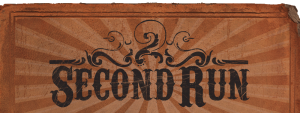 Editor Jim Coppoc debuted the new quarterly Second Run at AWP 2009. Second Run was started to address the “problem” of previously published works that have fallen out of public access or were never accessible online. Second Run accepts re-submissions of poems, plays, essays, and short stories along with a one-paragraph provenance to let readers know where the piece came from, where you were in life when you wrote it, where it was first published, etc. Authors retain all rights except the non-exclusive right for Second Run to publish submitted work in perpetuity.
Editor Jim Coppoc debuted the new quarterly Second Run at AWP 2009. Second Run was started to address the “problem” of previously published works that have fallen out of public access or were never accessible online. Second Run accepts re-submissions of poems, plays, essays, and short stories along with a one-paragraph provenance to let readers know where the piece came from, where you were in life when you wrote it, where it was first published, etc. Authors retain all rights except the non-exclusive right for Second Run to publish submitted work in perpetuity.
For the first issue, Coppoc says he wanted something “special,” so “instead of posting mass solicitations in all the usual places, I spent a long time thinking about who has influenced me as a writer and as a literate human being. Then, I asked them for their work. Some of these writers are close friends, so I knew I’d get a response. Some I only know in passing, but I wanted to acknowledge the deep influence they’ve had on me by putting their work in this issue. I was pleasantly surprised to see that most of the people I asked for work actually sent it.”
Issue One includes prose by Michael Martone, Sheryl St. Germain, and John Domini, plays by Murray Wolfe and John Fenn, and poetry by Patricia Smith, Ted Kooser, Matt Mason, Heather Knowles, Jim Moore, Deborah Keenan, Ada Limon, and Bryonn Bain.
New Lit on the Block :: Dear Sir
Edited by Sandra Huber (a Canadian poet currently living, writing, teaching in Vienna, Austria), Dear Sir is a “nascent online journal created from the want to present innovative, unconventional or emerging voices in literature. It is based around the concept of quality over quantity, and will therefore only feature a clutch of writers in each issue whose work in some way, and somehow, surprises.
“Dear Sir, follows an intentionally minimalist layout, where the frame of the page defers to the writing within (where site is retina then writing = iris and page the sclera).
“The idea for Dear Sir, came about while reading Ulysses: if magazines like The Little Review and the Egoist never took a chance on serializing Joyce’s work in 1918, we may never have had it in 1922.”
The premier issue includes works by Benediktas Januševičius, Garry Thomas Morse, James Wilkes, Nathan Horowitz, Stephen Collis, Gloria Personne, and Alfred Noyes.
Dear Sir accepts short or long poems, narratives, fragments, notations of sound poems, marginalia, experiments and manifestos, traditional forms revamped, dialogues, monologues and monosyllables. Dear Sir, leans towards the poetic, the speculative and the cross-genre.
A note on language: work in English, German and French is currently being considered.
What Publishers Should Know
Publisher Confidential
Nicole found this one while out purusing the web: “It is a book compiled of over a hundred email responses from librarians, booksellers, and readers to the question ‘What do you wish publishers knew.’ It’s a joint project of Unshelved and BookExpo America.” It’s a quick read, with pictures no less, and I’d say I agree with most of the feedback!
Special CFS
I received a note from Dos Passos Review – apparently they’ve had some trouble getting their CFS ads out there, so to help them get word out a bit quicker, I’m posting this on the blog. Please let others know:
Dos Passos Review accepting fiction, creative nonfiction, and poetry submissions February 1-July 31, 2009. Limit 3-5 poems, 3,000 words prose. Send to: Editor, The Dos Passos Review, Dept.of English, Longwood University, 201 High St., Farmville, VA 23909. sase for reply only. See Web site for specific guidelines.
Fun With Words
Just as it says, for all you word-gamers out there: Fun With Words
What an Introduction
From Rick Rofihe at Anderbo.com: “Not accepted for the NYU MFA writing program, Harvard Law grad Jessica Pishko will enter Columbia’s in the fall — read her award-winning short story ‘Izzi Accepts a Bagel From Her Mother’ on Anderbo.” How can you not go and check that out? Here’s a bit more incentive:
Izzi definitely had her doubts, and she had tried calling once to tell her mother about it.
“Matt—how’s Matt?” her mother asked.
“He’s OK, I guess, I’m just not sure sometimes.”
“What, what do you mean?”
“Well, I just feel like he doesn’t understand me very well…I can’t explain it any better, I’m sorry.”
“What do you mean?”
“He just doesn’t understand me, I can just tell, it’s terrible, I’m sorry. I feel really bad about it, he means well.”
“Honey, who would understand you?”
Izzi picked up a framed photograph of her and her mother at Christmas; in it they were both wearing blue and have the same eyes. She threw it across the room and it shattered.
“What’s that?” her mother asked.
“Nothing, Mom, I just dropped a glass.”
Story South Remake and Million Writers
storySouth is up and running with a new look after a brief reshuffling hiatus, which is a relief to see considering how many magazines I’ve seen go on hiatus and never return: “Online fads can’t help but fade away; great writing endures. storySouth is all about the writing.”
storySouth is indeed back with new content for spring, and the Million Writers Award stories are now online. The top ten will be selected and available for public vote starting May 15, and thanks to some generous donors, it looks as though the prize pot is healthy.
Contest for Booksellers
Unbridled Books and NetGalley announce a contest inspired by author Emily St. John Mandel and our bookseller partners. We want to encourage booksellers to read e-galleys, and to make this possible, we are offering a SONY Reader to the three booksellers who craft the best handselling pitches for Mandel’s debut novel, Last Night in Montreal(pub. date June 2). The contest runs from May 1, 2009 through midnight on June 1, 2009.
Poets Respond to Art
Each month, TATE ETC. (“Europe’s largest art magazine”) publishes new poetry by leading poets such as John Burnside, Moniza Alvi, Adam Thorpe, Alice Oswald and David Harsent who respond to works from the Tate Collection. This April, Elaine Feinstein presents her poem, Isaac Babel Riding with Budyonny, based on R.B. Kitaj’s work of the same name. This work is not currently on display in Tate galleries, but Erasmus Variations by the same artist is on display in Tate Britain, and Isaac Babel Riding with Budyonny can be viewed on the Tate Collection online.
Writer in Residence UL Lafayette
University of Louisiana at Lafayette accepting applications for Writer-in-Residence and Professor/Associate Professor of English. Tenure-track position, beginning Fall 2009. Creative Writing-Fiction.
Duties: teaching one Creative Writing workshop per academic year, directing dissertations and theses, working with graduate and undergraduate students in creative writing, presenting at least one public reading or lecture each year, and participating in the department and university community. Continued publishing in field and other duties associated with holding a university position.
Qualifications: International reputation as a creative writer as evidenced by awards and publications in prestigious international venues, extensive publications in creative genres (fiction, poetry, drama, creative non-fiction), professional experience in teaching advanced Creative Writing workshops.
Send application letter, current CV, and names and addresses of three references to Professor James McDonald, Department Head, Department of English, University of Louisiana at Lafayette, P. O. Box 44691, Lafayette, LA 70504.
Week 1: Reading is Stoopid
Just in time for some end-of-semester humor – check out Robert Lanham’s Internet-Age Writing Syllabus and Course Overview for ENG 371WR: Writing for Nonreaders in the Postprint Era on McSweeney’s.
WSJ’s Take on E-Reading
How the E-Book Will Change the Way We Read and Write
“Author Steven Johnson outlines a future with more books, more distractions — and the end of reading alone”
The World Lit Conundrum
A recent article in Rueters looks at unsuccessful efforts by the Chinese literary culture to have their works considered abroad. Lack of background knowledge to fully be able to understand/appreciate the works as well as lack of English translators are cited as a couple reasons for this continued struggle. What books do get recognized? Mostly those which are banned in China; not necessarily the strongest examples of Chinese literature, but they get the translations and readership because of the controversy. Though, if the US is still showing a decline in readership for its own literature, what hope do other countries have in finding recognition here?
And an interesting counter or alter-perspective to this article is “Author, Author: The World of ‘world’ Literature” in which Pankaj Mishra comments on “literary cosmopolitanism” – in relation to Karl Marx and Susan Sontag (of all pairings) – and the rise of India as a force in the book world: “Cultural palates in this flattened world can only be progressively homogenised. Whether attempting social or magical realism, literary writers also become increasingly subject to market realism.”
Failbetter’s Got Alexie
Along with weekly installations of poetry, stories, multimedia, and whatever else fancies their tickle, Failbetter has an interview with Sherman Alexie in their Spring issue.
DOXA FIlm Fest
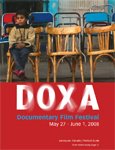 DOXA
DOXA
Documentary Film Festival
Vancouver, CA
May 22nd – 31st, 2009
DOXA is presented by the Documentary Media Society, a Vancouver based non-profit, charitable society (incorporated in 1998) devoted to presenting independent and innovative documentaries to Vancouver audiences. The society exists to educate the public about documentary film as an art form through DOXA – a curated and juried festival comprised of public screenings, workshops, panel discussions and public forums.
Free Mags for Teachers :: Geist
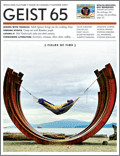 The Goods
The Goods
“Geist is delivering the best Canadian writing to classrooms from Tatamagouche to Victoria, from high school to grad school, from creative writing to English composition. Four times a year we publish fiction, life writing, essays, poetry, comix, rants, photo essays and unclassifiable dispatches — a cornucopia of genres and styles for teachers and students of writing.”
The Deal
“We send you a free class set of Geist.
We post free lesson plans that you can use in the classroom.
That’s it! No strings, no sales, no spam.”
The Agenda
“Geist is always looking for new writers and readers.
Writing teachers are always looking for new teaching ideas and opportunities for emerging writers.
Geist in the Classroom puts us together.”
Film :: War Rug
“War Rug is a work of documentary poetics in the form of a book length poem. Multiple interwoven narratives explore life within zones of conflict as viewed through the lens of current warfare. The narratives range from passages inspired by journal entries, firsthand accounts, and news reports to poetic constructs collaged from military doctrine, Freedom of Information Act released government documents (like CIA interrogation manuals, and detainee autopsy reports), and numerous other sources.” (Poet, translator, and new media artist Francesco Levato is the executive director of The Poetry Center of Chicago.)
NEA Overlooks Narrative Nonfiction
And Lee Gutkind has something to say about it on The Voice of Creative Nonfiction.
Allied Media Conference
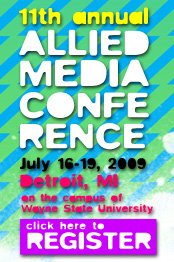 11th Allied Media Conference
11th Allied Media Conference
“We Are Ready New: Media and creativity to transform our selves and our world”
July 16-19, 2009
Detroit, Michigan
The 11th AMC will advance our visions for a just and creative world. It will be a laboratory for media-based solutions to the matrix of life-threatening problems we face. For the past 10 years, we have evolved our definition of media, and the role it can play in our lives – from zines to video-blogging to breakdancing, to communicating solidarity and creating justice. Each conference builds off the previous one and plants the seeds for the next. Ideas and relationships evolve year-round, incorporating new networks of media-makers and social justice organizers. The 2009 AMC will draw strength from our converging movements to face the challenges and opportunities of our current moment.
Scholarly Journals :: Works and Days
 Published by the English Department at the Indiana University of Pennsylvania, Works and Days provides a scholarly forum for the exploration of problems in cultural studies, pedagogy, and institutional critique, especially as they are impacted by the transition from print to electronic environments. Each issue of the journal is organized around specific inquiries conducted as shared disciplinary or postdisciplinary research projects. Works and Days aims to serve not only as a forum for collaborative research and teaching, but also as an environment in which mutual inquiries may flourish.
Published by the English Department at the Indiana University of Pennsylvania, Works and Days provides a scholarly forum for the exploration of problems in cultural studies, pedagogy, and institutional critique, especially as they are impacted by the transition from print to electronic environments. Each issue of the journal is organized around specific inquiries conducted as shared disciplinary or postdisciplinary research projects. Works and Days aims to serve not only as a forum for collaborative research and teaching, but also as an environment in which mutual inquiries may flourish.
Issues include:
Academic Freedom and Intellectual Activism in the Post-9/11 University
v26-27, 2008-2009
The Society for Critical Exchange–Phase 1: 1975-1988
v25, 2007
Intellectual Intersections: Ethnic and Racial Crossings
v24, 2006
Richard Ohmann: A Retrospective
v23, 2005
Capitalizing on Play: The Politics of Computer Gaming
v22, 2004
Who’s New at the Academy?
The American Academy of Arts and Letters will hold its annual induction and award ceremony on Wednesday, May 20, 2009. President of the Academy, McClatchy stated, “The Academy is proud to welcome to its ranks these distinguished new members. It’s an eclectic group of exceptional individuals—each a pioneer of the imagination and an artist of resplendent gifts and achievements.”
Nine members will be inducted into the 250-person organization: artist Judy Pfaff and architect Tod Williams; writers T. Coraghessan Boyle, Jorie Graham, Yusef Komunyakaa, and Richard Price; composers Stephen Hartke, Frederic Rzewski, and Augusta Read Thomas.
Academician Louise Glück will deliver the Blashfield Foundation Address, titled “American Originality.” An exhibition of art, architecture, books, and manuscripts by new members and recipients of awards will be on view at the Academy’s galleries from May 21 to June 14, 2009.
Teachers on Twitter
Laura Walker has some tips for educators getting started on and using Twitter for professional development and networking, as well as regular Twitter updates on her blog.
They’re Here!
National Magazine Award Finalists
The American Society of Magazine Editors has announced the 2009 National Magazine Awards Finalists. Congratulations to literary magazines Antioch, The Virginia Quarterly, The American Scholar, and The Paris Review who made the list!
Passings :: James D. Houston
Comics Archive Online
New at the University of Nebraska-Lincoln library: Government Comics Collection. With nearly 200 entries, there’s a wide range of content – from Fighting Apartheid to The True Story of Smokey the Bear. All are available full-text pdf.
Forgotten Pulitzers
Before adding a new author to the list of winners, AbeBooks has compiled a list of “forgotten winners of the Pulitzer Prize for Fiction and the Pulitzer Prize for the Novel as the award was known prior to 1948.” Winning does not secure lasting fame, or even books that can still be found on the shelf, as the price of some of these out-of-print editions will show.
New Lit Mag Reviews Posted
NewPages Literary Magazine Reviews for April 18 include The Antioch Review :: The Chaffin Journal :: ChiZine :: Eclectica :: The Farallon Review :: Journal of Ordinary Thought :: Manoa :: The Missouri Review :: storySouth :: The Sun :: Tuesday
Passings :: Eve Sedgwick
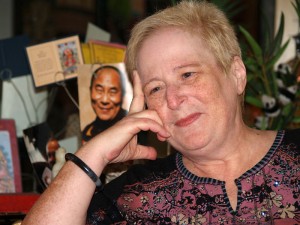 Educator, Author Eve Kosofsky Sedgwick Dies at 58
Educator, Author Eve Kosofsky Sedgwick Dies at 58
By Advocate Writer Michelle Garcia
Eve Kosofsky Sedgwick, a prominent theorist who is often cited as one of the founders of queer theory, died on April 12. She was 58.
Sedgwick was reportedly diagnosed with breast cancer in 1991, prompting her book A Dialogue on Love. Sedgwick taught English at several institutions including Boston University; the University of California, Berkeley; and Duke University, where she was a Newman Ivey White Professor of English.
Sedgwick has written many books on gender and sexual orientation, including Between Men: English Literature and Male Homosocial Desire; Epistemology of the Closet; and Tendencies.
Documentary :: Ferlinghetti
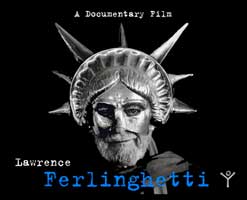 Lawrence Ferlinghetti turned 90 last month, and this month will see the premiere of a documentary about Ferlinghetti’s life and work on April 28 at the San Francisco International Film Festival.
Lawrence Ferlinghetti turned 90 last month, and this month will see the premiere of a documentary about Ferlinghetti’s life and work on April 28 at the San Francisco International Film Festival.
Director Christopher Felver crafts an incisive, sharply wrought portrait that reveals Ferlinghetti’s true role as catalyst for numerous literary careers and for the Beat movement itself. The film features archival photographs and historical footage, with appearances by Allen Ginsberg, Michael McClure, Billy Collins, Dennis Hopper, Robert Scheer, Dave Eggers, and Pulitzer Prize winner Gary Snyder. The appearance of numerous other prominent figures from the literary, political, and art community further underscores the enormous social impact Ferlinghetti’s legacy continues to have on the American cultural scene.
Book Cover Banquet
With (currently) over 1000 images, The Book Cover Archive presents “An Archive of Book Cover Designs and Designers for the Purpose of Appreciation and Categorization.” You can browse all, or refine to browsing to full alpha lists of designers, titles, authors, art directors, photographers, illustrators, genres, publication date and publishers. Thanks for the feast goes to Ben Pieratt and Eric Jacobsen who edit and maintain The Book Cover Archive.
Awards :: Ruminate
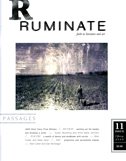 The newest issue of Ruminate (11, Spring 2009)features the magazine’s 2009 Short Story Prize winner, as selected by Brent Lott: Susan Woodring with her story “The Smallest of These.” Woodring’s story can also be read online. Anna Maria Johnson’s story “Charlie’s Arm” was the runner-up and is also included.
The newest issue of Ruminate (11, Spring 2009)features the magazine’s 2009 Short Story Prize winner, as selected by Brent Lott: Susan Woodring with her story “The Smallest of These.” Woodring’s story can also be read online. Anna Maria Johnson’s story “Charlie’s Arm” was the runner-up and is also included.
Art and Politics :: Guernica
From Guernica, an online magazine of art and politics:
POETRY: Acclaimed Puerto Rican poet Rafael Acevedo explores one of our last remaining taboos–cannibalism–in two poems.
FICTION: Panamanian author Justo Arroyo answers “The Question:” Why do we pay so much for our workaday lunch–and get so little in return?
ART: In “Beaufort West,” situated along South Africa’s N1 highway, with an island prison in the middle of town, Mikhael Subotzky captures the vivid characters and poignant social landscapes.
Detroit’s Media Renaissance
In addition to attracting moviemakers to the state (“Michigan will be the next film capitol of the world,” Clint Eastwood said in a recent interview following the release of his new film Gran Torino, shot in Detroit.), WireTap Magazine sees the full range of new media creativity booming in this auto-deprived town, from broadband to indie music to media arts and “allied media” projects. Can this be Michigan’s Phoenix?
Artist :: Soojung Cho
 “Most frequently I paint the sky; it is a space where we can find peace; it is a space for our soul; it is a space where we can find hope.” Soojung Cho, artist
“Most frequently I paint the sky; it is a space where we can find peace; it is a space for our soul; it is a space where we can find hope.” Soojung Cho, artist
Check out Soojung Cho’s online portfolio for more beautiful, peaceful oil paintings.
Zyzzyva: Textimage in Review
 The Spring 2009 issue of Zyzzyva offers readers a unique look at “textimage” with over 100 contributions in this single collection.
The Spring 2009 issue of Zyzzyva offers readers a unique look at “textimage” with over 100 contributions in this single collection.
From the Editor’s Note:
“Digital screens mash up words and pictures and videos and sound and links (to everything). The printed page segregates elements, putting them into their linear, orthogonal, rightful places.
“In this issue, we explore the spectrum of textimage, instances in which text and image collide and collude on the page-from the artist playing with that basic literary unit, the letter, to the writer sketching and doodling in his notebook.
Our take is not scholarly, but deliberately ecumenical, using examples from our pages over the past quarter century…”
Read more from Howard Junker, as well as view several of the works from this issue on Zyzzyva.
Self Publish in the News
Victoria Strauss on Writer Beware Blogs! responds to the recent flurry of mainstream news articles on self-publishing, and “The Need for Balance.” Strauss notes that “articles on self-publishing often follow a similar formula” and include:
1. Pick a rare instance of self-publishing success
2. Segue to the growth of self-publishing and the great possibilities it offers for budding authors, while taking a swipe at the commercial publishing industry
3. Toss out a few random facts about self-publishing
4. Mix in some boosterish quotes from representatives of self-pub companies
5. Feature a happy self-pubbed author
6. Conclude (explicitly or by implication) that “traditional” publishing is [pick one] dead/dying/running scared
For more “balance” – WB offers highly informative page on self-publishing, which includes the pros and cons, sales statistics, issues to consider, and advice on if you decide to move forward with SP/POD, as well as further resources to help you educate yourself. Check it out here.
What is Poetry For?
In Chicago, February 2009, at the annual conference of the Association of Writers and Writing Programs, the editors of Poems Out Loud asked eleven poets – Martha Serpas, Todd Boss, Molly Peacock, Major Jackson, Cole Swenson, Kim Addonizio, Kimiko Hahn, Willie Perdomo, Beth Ann Fennelly, Julie Sheehan, and Honor Moore – “What Is Poetry For?”

